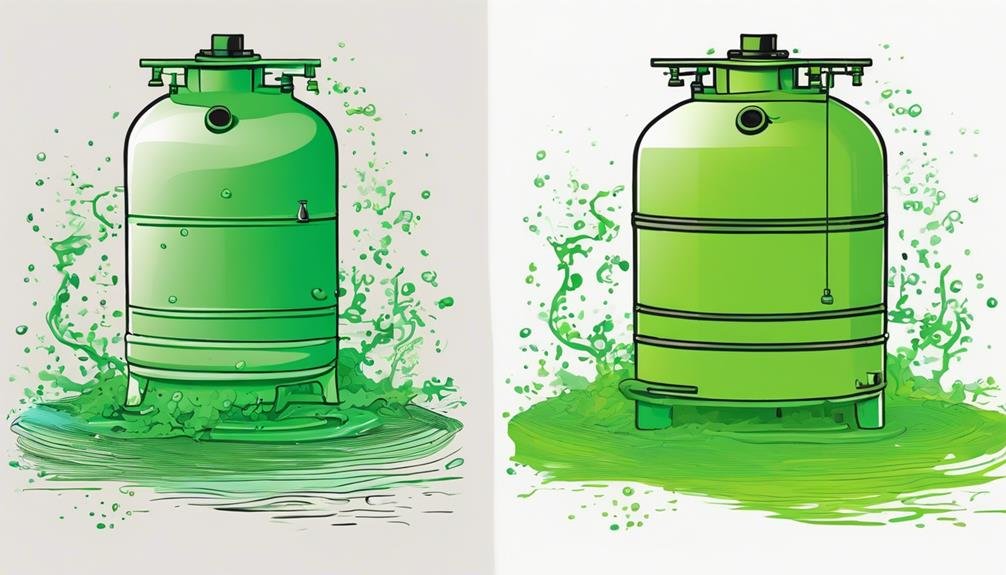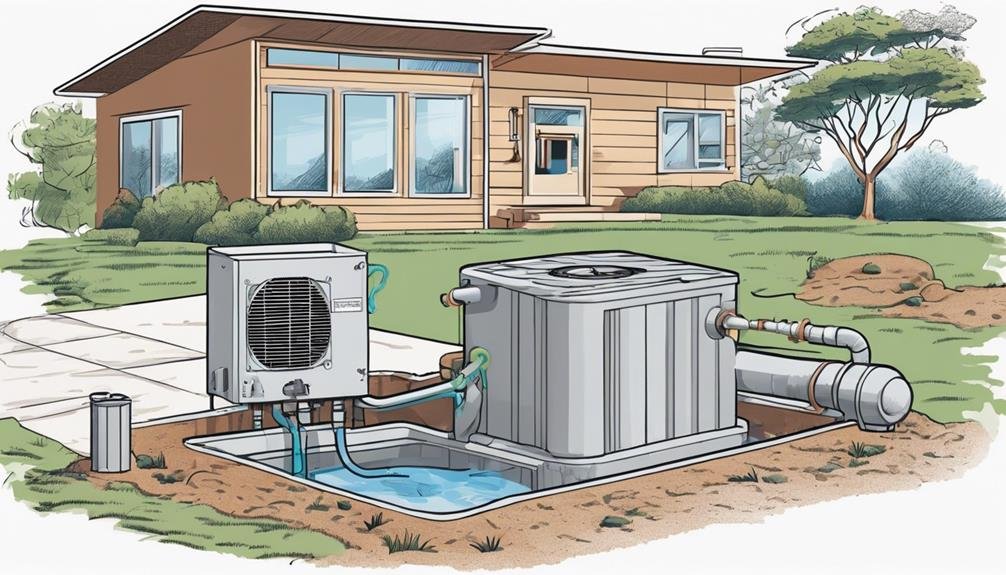When it comes to keeping your septic tank odor-free, staying ahead of the game is key. Imagine never having to worry about unpleasant smells emanating from your yard again.
By implementing the top 5 septic tank deodorizing techniques, you can ensure a fresh and clean environment for your home. From innovative bacterial additives to strategic ventilation improvements, these methods will transform your septic system maintenance routine.
Let's explore how these techniques can make a significant difference in your everyday life.
Key Takeaways
- Utilize bacterial additives to maintain microbial balance and reduce odors effectively.
- Implement aeration systems to optimize aerobic bacteria growth and enhance waste breakdown.
- Control odors and maintain system functionality with chemical treatments and regular pumping.
- Improve ventilation through vent pipes and aeration systems for better airflow and odor prevention.
Bacterial Additives

To enhance the microbial activity in your septic tank, consider utilizing specialized bacterial additives. These additives play a crucial role in maintaining a healthy microbial balance within your septic system, which is essential for effective waste breakdown and odor control.
Bacterial additives contain a concentrated blend of beneficial bacteria that help break down organic matter more efficiently. By introducing these bacteria into your septic tank, you can boost the existing microbial population, enhancing its ability to digest solid waste and prevent the accumulation of sludge and scum layers.
Maintaining a proper microbial balance is key to ensuring that your septic system operates effectively. When the balance is disrupted, either due to harsh chemicals or lack of bacterial activity, it can lead to unpleasant odors emanating from your tank. By regularly using bacterial additives, you can promote a healthy microbial environment, reducing the risk of foul odors and extending the lifespan of your septic system.
Aeration Systems
Consider incorporating an aeration system into your septic tank setup to optimize microbial activity and improve waste breakdown efficiency. Aeration benefits your septic system by promoting the growth of aerobic bacteria, which are highly efficient in breaking down organic matter. These systems introduce oxygen into the septic tank, creating an environment where aerobic bacteria thrive and decompose waste more effectively. Improved decomposition leads to reduced sludge buildup and fewer unpleasant odors.
To maintain your aeration system, regularly check for any clogs or blockages in the air diffusers to ensure proper airflow. Inspect the system's air pump to guarantee it's functioning correctly and replace any damaged parts promptly. Additionally, monitor the oxygen levels in the tank to ensure they remain at optimal levels for the aerobic bacteria to thrive. Proper maintenance of your aeration system will help maximize its efficiency and ensure your septic tank operates smoothly.
Chemical Treatments

How can chemical treatments enhance the efficiency of your septic tank system?
Chemical treatments play a crucial role in controlling odors and maintaining the drains in your septic tank system. These treatments contain powerful ingredients that break down organic matter, grease, and other buildup in the tank, preventing foul odors from escaping into your home or yard. By using chemical treatments regularly, you can ensure that your septic tank remains free from clogs and blockages, promoting proper drainage and preventing backups.
Effective chemical treatments work by introducing beneficial bacteria into the septic tank, which help break down waste more efficiently. These bacteria aid in the decomposition process, ensuring that solids are broken down and liquids flow smoothly through the system. Additionally, some chemical treatments contain enzymes that target specific types of waste, such as fats, oils, and grease, further improving the overall function of your septic tank.
Regular Pumping Schedule
Regular pumping of your septic tank is essential to prevent buildup and maintain optimal system functionality. To ensure effective odor control and prevent system failure, it's recommended to establish a regular pumping schedule based on your household size and water usage. Typically, experts advise pumping your septic tank every 3 to 5 years. However, this frequency can vary depending on factors such as the number of occupants in your household, the size of the tank, and the amount of wastewater generated.
To maintain a healthy septic system and minimize odors, consider implementing some maintenance tips. Avoid flushing non-biodegradable items down the drain, such as paper towels, wipes, or feminine hygiene products. Be mindful of the chemicals you use in your household cleaning routine, as harsh chemicals can disrupt the balance of bacteria in the septic tank. Additionally, conserve water to prevent overloading the system, and fix any leaks promptly to avoid excess water entering the tank.
Ventilation Improvement

Improving the ventilation in your septic tank system can significantly reduce odors and enhance overall performance. To achieve this, consider the following:
- Install a Vent Pipe: Adding a vent pipe to your septic system allows for improved airflow, helping to release gases and prevent odor buildup. This simple addition can make a significant difference in reducing unpleasant smells around your property.
- Check Existing Ventilation: Ensure that your current ventilation system isn't blocked or obstructed. Blockages can hinder proper airflow, leading to increased odors. Regularly inspect and clean existing vent pipes to maintain optimal ventilation.
- Consider Aerating Systems: Aerating systems can help enhance ventilation within the septic tank, promoting the growth of beneficial bacteria that aid in waste breakdown. These systems can improve airflow and contribute to better odor control.
Conclusion
In conclusion, maintaining proper septic tank deodorizing techniques is crucial for preventing foul odors and ensuring the longevity of your system.
By utilizing bacterial additives, aeration systems, chemical treatments, regular pumping schedules, and improving ventilation, you can keep your septic tank odor-free and functioning smoothly.
Remember, with these top 5 techniques, your septic tank will be fresher than a field of blooming flowers on a sunny spring day!

